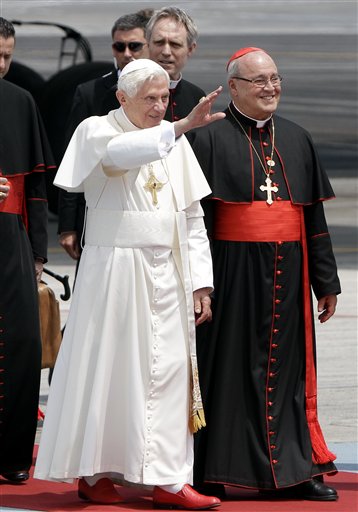In dissidents’ arrest following Pope’s Cuba visit, a Cardinal neglects his flock
By Achy Obejas

In dissidents’ arrest following Pope’s Cuba visit, a Cardinal neglects his flock
By Achy ObejasCuban authorities arrested dissidents Vladimir Calderón and Julio Beltrán on April 28. Their crime? The two men were accused of passing out anti-government flyers and organizing an anti-government march on May 1. Both men were publicly beaten as they were arrested.

If anyone should be held responsible should something happen to Calderón and Beltrán while in custody, I point a finger squarely at Havana Cardinal Jaime Ortega.
The crux of this story lies in Pope Benedict XVI’s recent visit to the island. Dissident groups saw an opportunity to have this self-proclaimed man of peace intercede with the government for them, or at the very least acknowledge them. Many Cuban dissident groups are Catholic, including the country’s best known opposition group, The Ladies in White.
Calderon and Beltrán’s group, the Republican Party of Cuba, is small and mostly unknown. They meet and pray together on the 13th of every month at the Church of the Virgin of Charity in central Havana, a crumbling neighborhood of tremendous poverty and crime just outside the city’s tourist belt.
When they learned of the Pope’s impending visit, they prepared a list of demands they hoped the pontiff would discuss with President Raul Castro. The demands included freedom for political prisoners, a stop to the repression of dissidents, freedom to travel, freedom of association, economic freedom, access to private property, internet access, wage increases, more food for children and a dialogue between the government and its opposition. Pretty standard stuff, at least for those of us living under the Constitution and the Bill of Rights.
Their idea was to deliver the list to the Pope via the Church of the Virgin of Charity. But when presented with the document, the parish priest refused to accept it, thus setting off a complicated back and forth between the dissidents and the archbishop’s office. The dissidents, fearing they’d be victims of a government rapid-response mob outside the church, refused to leave until a church official came to talk to them.
And what did Cardinal Ortega do? He requested that members of the national police force enter the church and forcibly remove the group of 13 men, women and children, sanctuary be damned.
The Pope came and went from Cuba, salsa dancing with the excommunicated Fidel (in 1962), saying not a word about, nor once acknowledging, never mind meeting with, any of the dissidents.
And then the Cardinal went to Harvard.
Ortega said the entire incident, which he described as the “occupation” of the Church of the Virgin of Charity, had been a plot planned by Miami exiles against the government.
And the dissidents? “They were a group that – this pains me a lot – all of them were former delinquents,” said the Cardinal. “There was a former Cuban prisoner who had been returned to Cuba, he had been in prison for six years and was one of the excludable people who were sent to Cuba […] among them were people without any cultural level, some with psychological disturbances.”
The Miami Herald broke down the background of group’s members. They are mostly working class people (one survives by fixing lighters), but several have a college education and professional careers, including Calderón.
The extraordinary thing, to me, in the Cardinal’s declaration, though, is his use of the word “delinquent”: a government favorite to discredit its critics.
And, of course, the Cardinal’s cruel dismissal of the very people that Jesus would have called us to protect: the voiceless and oppressed, the poor and powerless.